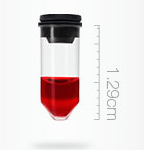 IRIS (Image Right, Image Safe) is a commitment that started at Dartmouth-Hitchcock Medical Center (D-H) to ensure that not only was dose being reduced, but that patients were receiving only necessary medical imaging exams. Karen Burgess, M.
IRIS (Image Right, Image Safe) is a commitment that started at Dartmouth-Hitchcock Medical Center (D-H) to ensure that not only was dose being reduced, but that patients were receiving only necessary medical imaging exams. Karen Burgess, M.
 IRIS (Image Right, Image Safe) is a commitment that started at Dartmouth-Hitchcock Medical Center (D-H) to ensure that not only was dose being reduced, but that patients were receiving only necessary medical imaging exams. Karen Burgess, M. Ed., RTRM, of D-H presented on Monday, July 29, about IRIS and how it takes awareness and education to properly reduce dose to patients while still providing them with quality care.
IRIS (Image Right, Image Safe) is a commitment that started at Dartmouth-Hitchcock Medical Center (D-H) to ensure that not only was dose being reduced, but that patients were receiving only necessary medical imaging exams. Karen Burgess, M. Ed., RTRM, of D-H presented on Monday, July 29, about IRIS and how it takes awareness and education to properly reduce dose to patients while still providing them with quality care.
IRIS was inspired by the Image Gently campaign, which seeks to promote radiation protection in the imaging of children. This is not a new cause in the medical imaging field, but Burgess explained how D-H was a textbook example of how dose reduction can be achieved within a large medical system, and how it takes many processes to make it happen.
Burgess commented on how the medical imaging field has seen a near doubling in ionization exposure over the past three decades. One area this continues to grow is in relation to sports injuries, particularly in children ages 5-14. In total, about 750,000 medical images are conducted per year in this age group on account of sports injuries and that number is only growing larger. With a trend like this, efforts are needed to reduce unnecessary imaging and that involves including the healthcare provider as well as the patient in the education about medical imaging exams.
In 2010, Burgess’s colleague, Dr. Peter Spiegel addressed the imaging controversies and emphasized the need for a more enforced and balanced approach. D-H needed to improve on addressing patient concerns about radiation safety, and from that, IRIS was born. It’s mission statement reads as such:
Promote patient safety in medical imaging by initiating, supporting and coordinating activities designed to reduce radiation dose while maintaining appropriate standards of imaging quality; ensure that referring clinicians have all necessary resources and incentives to make appropriate decisions in the ordering of imaging procedures; and raise public awareness of the uses, benefits, limitations, and risks of medical imaging.
From this, D-H instituted several key procedures to ensure it was living up to the IRIS mission statement. These included such activities as creating a dedicated position of “radiation safety officer,” requests for CT must be subject to a verification protocol to ensure that low dose or radiation free alternatives (MRI, ultrasound) are ruled out prior to the CT, and adherence to voluntary ACR and TJC guidelines, which are more comprehensive and stringent than required by regulations in New Hampshire.
In her conclusion, Burgess left off with key points that attendees could take away to institute their own initiative similar to IRIS to help reduce dose in their hospitals. These included seeking a physician project champion who could lead the initiative, creating a mission statement, and defining clear and attainable goals for the initiative.
Dose reduction, while an ever-important trend in the medical imaging landscape, can be difficult to achieve on account of the exams being a necessity to diagnostics and patient health. Careful planning and organizational initiatives to make dose reduction a reality can be to the key to accomplishing this and ensuring that patients are taken care of to the highest degree in our facility.
(medical imaging / shutterstock)








